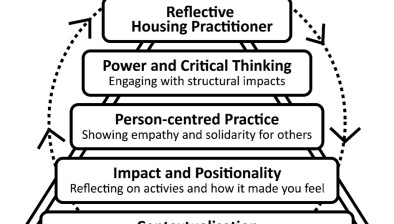Fiona Pask: Could retrofitting be the answer to resolving the damp crisis in Scotland?

Fiona Pask
While retrofitting is well-recognised as beneficial for enhancing energy efficiency, there remains little discussion around how it could help to resolve damp and mould issues in homes throughout Scotland, writes Fiona Pask.
Retrofitting is the act of refurbishing and modernising social housing stock in order to futureproof developments. As well as making the buildings more durable, it improves efficiency, helps tenants to save money on energy bills and contributes to an improved quality of life.
For example, upgrading a home’s insulation ensures the property can be properly heated, keeping its tenants warm in the winters as well as reducing the risk of damp. These types of upgrades can also save social housing providers money in the long-term; particularly in areas where housing stock is depleted or building new homes is simply not affordable.
While retrofitting is crucial to improving the energy efficiency of older homes, it could also be an essential tool in tackling widespread damp issues. However, many Scottish housing associations are yet to fully benefit from this futureproofing practice. This could be about to change, as a recent letter sent to MSPs has urged politicians to prioritise policies that will help to end the damp homes crisis in Scotland, in tandem with the efforts of landlords and social housing providers and recognise retrofitting as a crucial part of the solution.
In order for retrofitting projects to get underway, barriers and challenges must be addressed. For example, the Scottish Parliament currently has no set guidance regarding retrofitting standards, making social housing providers and landlords wary of undertaking large scale projects in case they fall foul of future changes.
Add to this the large upfront investment required and potential resistance from tenants who may be concerned about the inconvenience, and it is little wonder that retrofitting has yet to truly take off. Without suitable financial incentives and proper government support, most landlords are simply unable embrace retrofitting and refurbishment to the extent required.
With reports of damp by social housing tenants spiking by 20% earlier this year, retrofitting is a comprehensive way for landlords to reduce the risk of damp, if not eliminate it entirely. Damp can cause a variety of health issues, including severe respiratory problems, so providing sustainably warm and dry homes is vital to protecting tenants and minimising the risk of potential future claims.
To change perceptions surrounding retrofitting, it’s crucial that the benefits are highlighted and that tenants are “bought-in” to the process. Transparency concerning the impact of the construction, how long the disruption may last and why it is necessary is essential to maintaining a good relationship between tenants and landlords – as is education surrounding the process and ultimate benefits.
While retrofitting often offers improved quality of living, any form of change can be challenging particularly for elderly and vulnerable tenants. While there are many examples within the Scottish social housing community of excellence in new build properties, demonstrating similar or vastly improved outcomes can be achieved for existing, older stock will be key to bringing tenants onboard.
The conversation around retrofitting is gathering pace in Scotland, however, action needs to be taken quickly to solve the growing damp crisis and attempt to prevent longer-term damage. Comprehensive retrofitting guidelines published by the Scottish Parliament and financial incentives for social housing providers would go a long way to help this.
With the financial strain on social housing providers at an all-time high, the impact of a high volume of potential claims cannot be underestimated. Retrofitting may well be the answer to future proofing properties, protecting tenants health and avoiding potential future claims when it comes to damp.
- Fiona Pask is a dispute resolution expert at law firm Shakespeare Martineau








